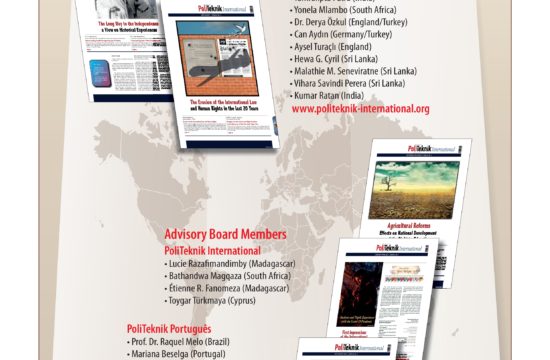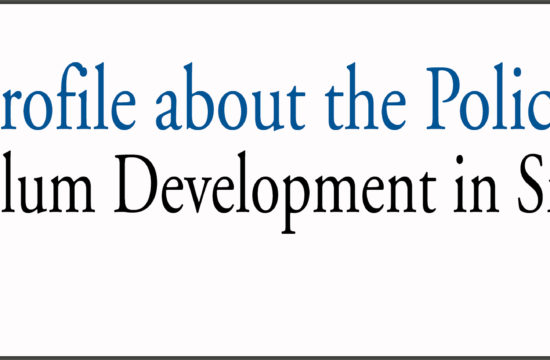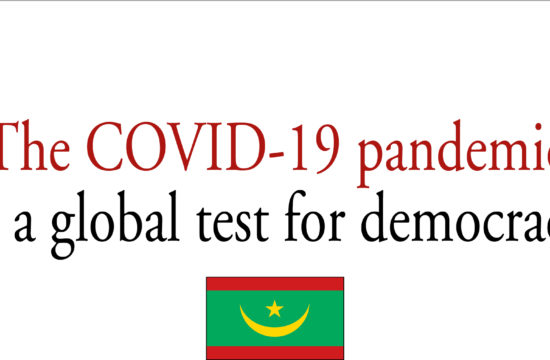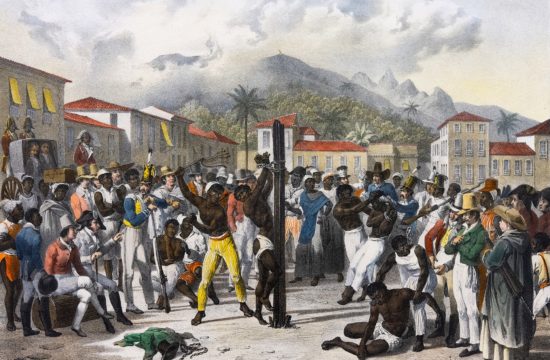PoliTeknik
Dear professors, teachers and students, Greetings from PoliTeknik! The main objective of PoliTeknik is to work towards the modifi cation of Article 26 of the Universal Declaration of Human Rights (UDHR) which deals with the Human Right to Education. This would ensure that every child and adult has the right and access to quality education. With this in mind, PoliTeknik started the project „Extension of Human Right to Education“. The project is designed to provide a platform for all the stakeholders, students and teachers alike, from around the world to come together and understand the needs that are new or neglected. PoliTeknik is making strides toward its aim through our gratis and ad-free newspaper published in fi ve languages with support of volunteers from more than 20 countries spanning 5 continents, various symposiums with the help from partner universities and publication of e-books with the help from student unions, professors and social activists.
As a part of the above-mentioned project, PoliTeknik intends to conduct a global scientifi c survey and welcomes every university around the globe to participate in it. This survey would help us understand the issues university/college students face. Aim of this survey is to provide a platform to critically discuss the problems related to quality, affordability, and accessibility of education; privatization and commercialization of education; the increasing cost of basic amenities, etc. A lot of these problems have intensifi ed during the current global pandemic and have highlighted major fl aws in the current system and available resources everywhere. In addition to this, the survey would help us understand how students perceive equal opportunity and quality education.
Comprehensive details of the survey, its objective & methodology, and the project „Extension of Human Right to Education“ are in the invitation document attached. Once you have decided to be a part of the survey, an MoU/agreement will be sent to the corresponding department/university/union which will have all the finer details of the survey.
Please feel free to contact us for any query related to the survey and let us know if you will be available for a Skype meeting.
To receive further updates of the survey (skype meetings and emails) we request you to fill out this google form to help us connect in the future.
https://forms.gle/LANpjiDW6X9ZgFfo8
Anticipating a positive response and looking forward to a fruitful partnership.
Sincerely
Prof. Raquel Melo
Akash Yadav
Tamralipta Patra
info@politeknik.de
www.politeknik.de
http://politeknik.de/language/de/
Dear professors,
PoliTeknik proposes to organize a global scientifi c survey to better understand the problems that college/university students face every day, from increasing cost of education to basic necessities like decent housing, from privatization of education to student protagonism (which has taken center stage in so many countries in the recent past). This critical discussion among participants of the survey would help understand different perspectives and possible solutions to problems faced by students from different cultures, identities, religious, social status/classes and regions of the world. Their input becomes quintessential in understanding how they perceive equal opportunity and quality of education. This is possible when students are dynamically involved in the discussion. This survey will be a part of the project “Extension of Human Right to Education” which focuses on modifi cation of Article 26 of UN Declaration of Human Rights in the sense of a progressive enlargement (details below).
Methodology/approach – This survey has both quantitative and qualitative component, it will be conducted at university/college level with the help of our partners in different countries. This survey is spearheaded by Prof. Raquel Melo, UNIVERSIDADE ESTADUAL DA PARAÍBA, Paraiba, Brazil.
Based on Paulo Freire’s Research Action approach and critical pedagogy, this can only be achieved by dynamic involvement of students, where participating students are not just object of the study, but active subjects of social transformation. Circles of dialogue among students will be an important element of this scientifi c qualitative survey.
Survey includes basic quantitative questions in order to draw correlational conclusions during the analysis. And, the qualitative questions (for e.g., regarding student protagonism, quality education) can act as anchor for the survey and ensure that there is a critical discussion among the participants and they can analyze solutions to these questions themselves. Empowering students to think critically about their reality will be an outcome of using this research approach.
Findings (Tentative) – This survey would try to fi nd answers for the problems in real situations, investigate topics used in discussion with a clear objective, which for our context is: Extension of the Human Right to Education. The core set of questions for discussion will guide us towards this objective. Themes generated from individual local studies will be used to fi nd common themes spanning the globe. Our fi ndings and novel solutions can then be presented to the UN as a part of this project.
Practical and social implications – This collaboration with voices from students and other stakeholders (partner universities, students and teachers’ unions, academicians etc.) through e-book, PoliTeknik publication, symposiums and surveys can help us understand the dimensions of this huge undertaking, extension of the human right to education.
Originality/value – This survey would provide an overall understating of students’ idea and perspective on certain specifi c issues that needs to be highlighted. The conceptual work can be useful for future research that attempts to further expand this. It also provides an opportunity for student bodies both as participants and ushers of the survey. Partner universities which are already a part of the project “Extension of Human Right to Education” can help expand the number of local discussions and dialogues among students. Findings from the analysis of the survey can form basis for our recommendation to the UN.











